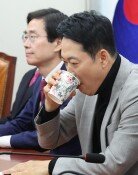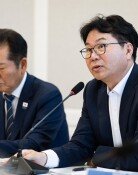Beijing’s premature meddling in Pyongyang’s denuke process
Beijing’s premature meddling in Pyongyang’s denuke process
Posted June. 22, 2019 07:24,
Updated June. 22, 2019 07:24
Chinese President Xi Jinping returned to Beijing after completing his two-day state visit to North Korea. Xi told North Korean leader Kim Jong Un, “We will try and help you to the extent we can to enable North Korea to resolve reasonable concerns over its safety and development,” in expressing his intention to play a more proactive role for the North. “We will remain patient,” Kim said. “I hope that related countries will hold meetings with North Korea and address issues of mutual concern.”
Expectations ran high that Xi’s visit to North Korea will pave the way for resuming dialogue between Washington and Pyongyang. The hasty expectations will unlikely bring any outcome. Xi stressed the need for dialogue, urging “political compromise,” but the North Korean leader expressed his intention to continuously resist (sanctions) by suggesting “patience.” Notably, Kim said, “We took a number of proactive measures but failed to earn positive responses,” in revealing his discontent towards Washington. He thus reiterated his previous stance that Washington should change its calculation by the end of this year. If Beijing chooses to compensate Pyongyang for Kim’s unprecedentedly warm hospitality, it could end up helping reinvigorate the North, which has almost completely exhausted its vitality.
Chances are high that Beijing’s voluntary move to take a proactive role will make future nuclear talks all the more challenging and difficult. The North’s security issue, which Xi pledged to help with, is the same rhetoric as “switching denuclearization with security guarantee,” which Russian President Vladimir Putin argued after meeting with Kim Jong Un in April. Xi could seek to convey Pyongyang’s demand when he meets with U.S. President Donald Trump at the G20 Summit in Japan as early as next week. Particularly, the possibility cannot be ruled out that Beijing will raise issues over Northeast Asian security, including withdrawal of U.S. troops from South Korea and extraction of strategic nuclear assets, which are highly sensitive matters for Beijing, and thus make it completely impossible to resolve the North’s denuclearization.
China cannot be ruled out in the course of resolving the North’s nuclear issue forever. Beijing’s role as a guarantor for the establishment of a peace regime on the Korean Peninsula cannot be disregarded. However, China’s intervention at a time when Pyongyang-Washington talks have not advanced even a single inch forward is way too premature. For one thing, if the two-way dialogue structure between Pyongyang and Washington or the three-way dialogue regime between Seoul, Pyongyang and Washington transforms into four-party talks between Seoul, Pyongyang, Washington and Beijing, finding a solution to the nuclear issue will become all the more complex. The problem will become even more serious if Beijing volunteers to serve as arbitrator amid an intensifying trade war between the U.S. and China, and seeks to use the Korean Peninsula issue as a bargaining chip for a trade deal. This will constitute a horrific nightmare to both South and North Korea on the peninsula.







